Schooled in Movies: Cristian Mungiu talks about Graduation
While attending the 41st Toronto International Film Festival, Trevor Hogg had an opportunity to speak to Romanian filmmaker Christian Mungiu about cinema, a unique reunion, and the challenges of shooting single shot scenes for his family drama Graduation…
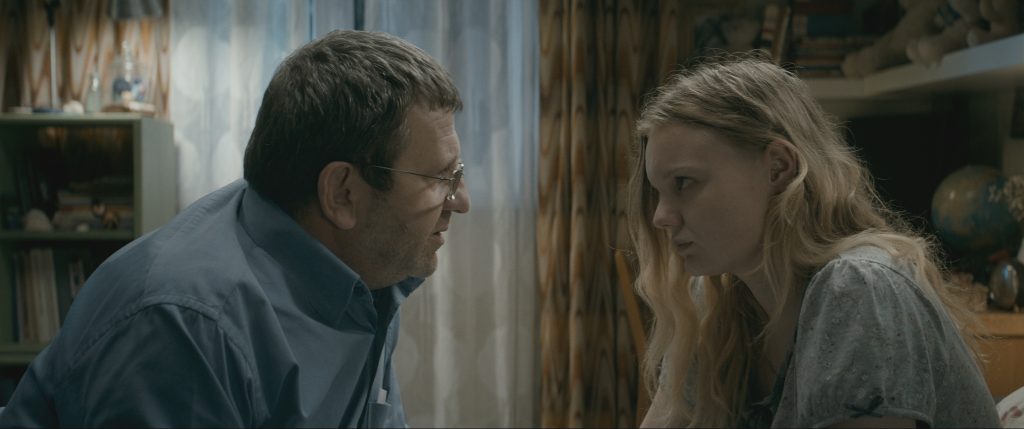
Considering his thoughtful approach towards making movies it is not surprising to learn that before studying film Cristian Mungiu had careers in teaching and journalism. The native of Iaşi, Romania is greatly loved in Cannes winning the Palme d’Or for 4 Months, 3 Weeks and 2 Days, participating as a jury member in 2013, and being awarded Best Director for his fifth and latest effort Graduation. The domestic thriller revolves around a physician and adulterer (Adrian Titieni) whose plans for his daughter (Maria Drăguş) to obtain a higher education abroad are thrown in disarray when she is sexually assaulted on her way to school.
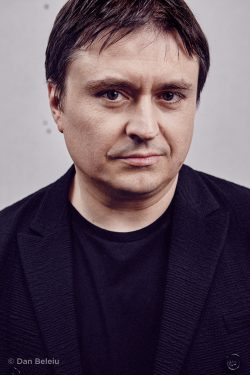
Christian Mungiu
You must be really pleased with the festival reaction for Graduation.
I am pleased not only with the festival reaction but with the reaction of the audience. The film started well theatrically in Italy which is the first major territory. I toured my own country with Graduation and discovered even in a small place where there’s no cinema if you organize a screening there’s going to be something that speaks to people. While here in Toronto there was a funny thing that happened which I liked a lot; it was a memorable Q&A for me because there was this lady in the audience who made an important comment to me about 4 Months, 3 Weeks and 2 Days which I screened here nine years ago. I quoted her often in interviews. She was crying by the end of the film and told me that it’s not fair to make a film about her life. It’s important to make films that people feel are as close to them as their own life. She had been following my quotes about her for the past nine years. It was like the beginning of a new relation because now she gave me her business card and I’m interested in hearing her life story.
You must have been happy with what happened at Cannes.
I’m happy because I was lucky again to get an award but it’s fair to say that the awards do not necessary mean that the film you made is good or it’s better than the other films which didn’t win. It just means in that circumstance those people who were in the jury liked your film better. It’s important to me as a filmmaker to hope that my films will still be good enough if you watch them five or ten or twenty-five years from now.
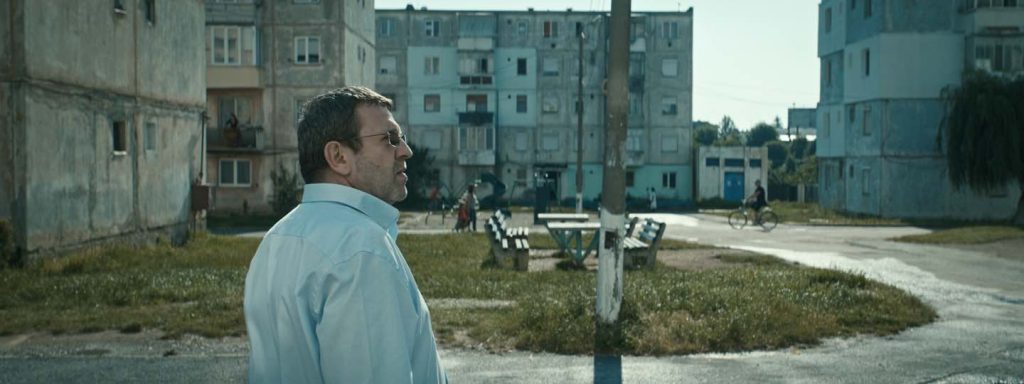
You want people 10 years from now to still discover things in your movies.
There’s a benefit of working in a small industry with little money. The success of a film locally is not measured by the box office. Primarily what people and the film community are interested in is whether the film represents a strong point of view about cinema.
The lower the budget means more artist control.
I’m not sure it’s connected because I’ve seen so many small budget films shot with lots of enthusiasm but they are still bad films. What’s good about the way we work is we are not only the writers and directors of our projects but producers too. Also we don’t work with private money. All of the films being shot in Romania are only being financed by funding destined for cinema. Some of it comes from Romania. Some of it comes from European funding that you can access or co-production money from countries like France or Germany or money from the presales.
How do you find the right balance between artistic and accessible?
I’ve found a way to tell the stories that intrigue me which are still accessible for the spectator. I don’t believe in the kind of cinema in which the film is so difficult that you are impressed but don’t understand precisely what it speaks about. I want my films to be as complex as possible to respect this complexity that I see in life so my films are layered. They have social and personal components.
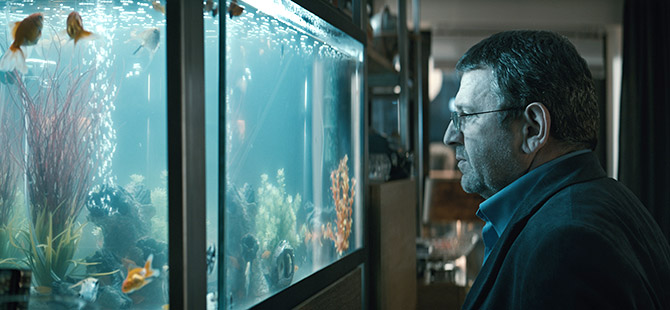
Is it much more difficult doing master shots that are not broken up by close-ups?
It’s way simpler to shoot in the traditional way. If you do coverage, and the actors and the editor are good your contribution as a director won’t be so important. The style that you see in my film is the result of a conscious decision to make a kind of cinema that looks close to life. There’s no editing in life. You can’t go for the reaction shot. There’s just one perspective which is subjective. You know as much as you know. I want people to watch my films as if they are witnessing the real moment in front of them.
Did you do a lot of rehearsals?
We did a lot of rehearsals. We spent a lot of time finding the right movement for everybody and the right position for the camera because everything needs to be precise. We shoot about 20 to 40 takes.
You are not afraid to have people talking with only the backs of their heads being seen by the viewer.
I’m not afraid because it’s a statement against mainstream cinema. Mainstream cinema is conventional. It is not about having a point of view about life. Mainstream cinema is just a language that you learn and apply but this is not personal. I want to speak my own language.
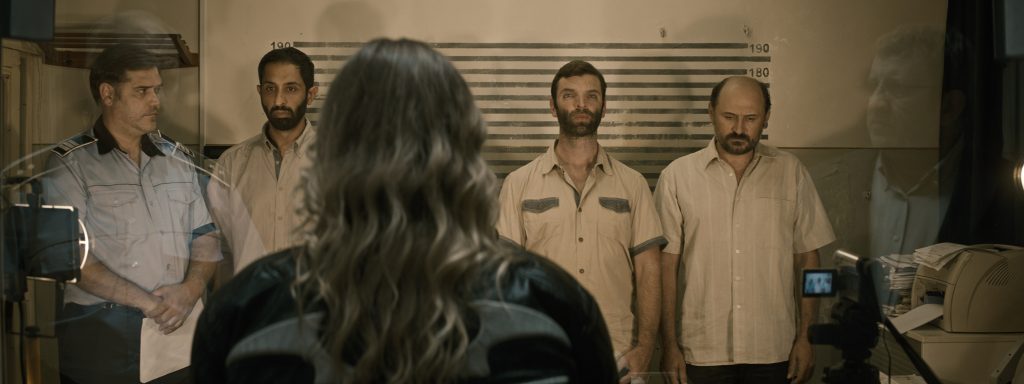
How do you create conflict that feels natural?
First of all none of those rules are to be taken for granted. You start becoming a filmmaker when you start questioning all of these rules. Do I need conflict? Maybe yes but not necessarily in every scene. Maybe the way the narrative advances in the film shouldn’t be so direct. Life is not like this. You have a lot of dead moments. I tried to present some of this in the films. People will look for a sense of progression. Why is this second scene coming after the first one? So as a filmmaker you need to be aware of this. If there’s something in your film that is not motivated by the situation you shouldn’t have it there. This is the way I write my screenplays. I try to let you analyse the story without having my comment or opinion about it.
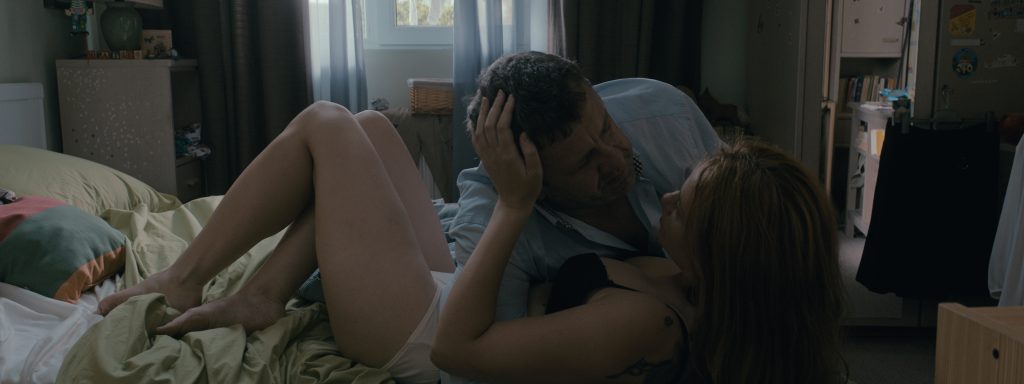
The audience becomes as disoriented as the father when he is walking home at night and hears a potentially threatening noise.
Everything is from his perspective but at the same time what is difficult with film is to speak about what’s inside somebody’s head. In literature you will write down words about this and you can describe how somebody feels. But in cinema you don’t have access to somebody’s internal thoughts and feelings. Everything is external so every time you need to speak about how somebody feels you need to invent an external element. For me it was important in that scene to do two things. To speak about the anxiety he feels, his sense of guilt and this desire of having somebody pay for the misfortunes that happen to him and his daughter. Because at some point you feel if your life wasn’t precisely how you wished it to be somebody must pay, somebody must be guilty. This is the way people think. There was another thing I was interested about in that scene. I wanted to make a scene where you see that his starting as a predator and then he ends up by being the prey.
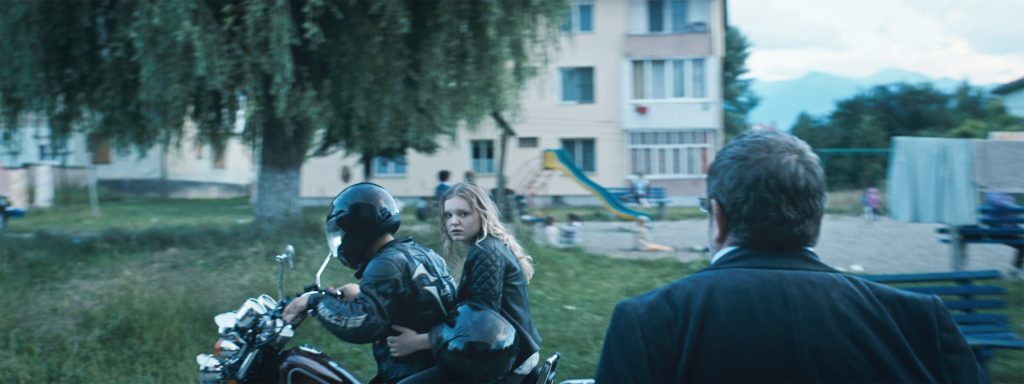
Did the cool colours reflect the coldness of the outside the world and the warm colours the friendlier confines of the apartment?
It’s difficult for me to communicate such precise thoughts. What I try to do is to have my film understood from everything in all of the scenes but not encapsulated in specific moments of dialogue or scenes or layers, like colours. There are two options when you shoot. For the exteriors things are going to be how they are where you decide to shoot so you can’t influence colour too much. What I like to do is to choose the right period of the year when you shoot and it’s mostly about the light. But for this film as much as I like to work in the shadows and during the wintertime I couldn’t because the action was so precise. It’s the end of the school year which is always at the beginning of the summer. For the interiors what I like to do is to make sure that there is a synergy of things which go together. What is important for me is to understand what kind of life they have. I’m not sure if this comes from the colours but I don’t like for example to have a million different colours in the shot. I have a certain taste for certain visuals. I always like a specific kind of order. If you watch my shots everything is precise, the lines are parallel, and the colours are more or less in the same tones. You see that they have a single child. There’s a portrait of the girl in every single room. You see that he is sleeping in a different room than she is sleeping in. So you understand the kind of marriage they are having. This is the kind of information I try to pass over in the visuals as much as I can.
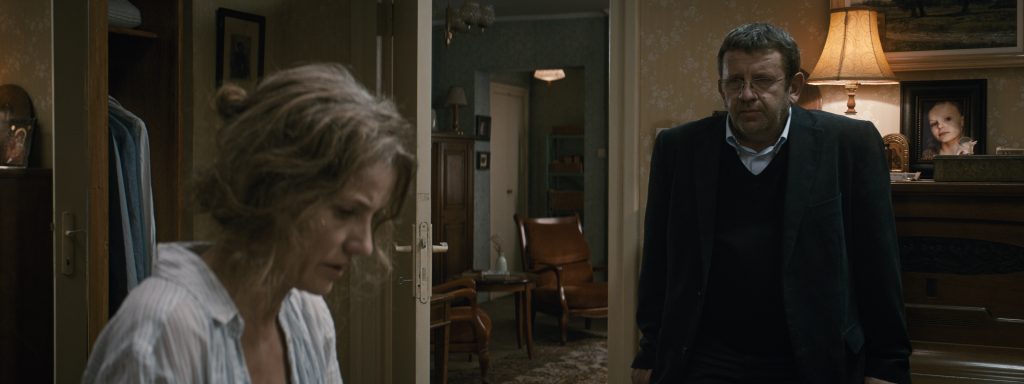
Were you able to use much of the available light?
I will tell the cinematographer more or less what kind of atmosphere that I want. What he does afterwards is up to him but I worked with a younger cinematographer [Tudor Vladimir Panduru]. I like a lot what he did. His choice was to use a lot of light but he never used direct light. I don’t like having shadows in the film so everything is diffused. It has a greater feeling.
How did you approach the use of music?
I do not use scores so everything comes from the shot. The only music you can listen and hear in the film is coming from the radio. This was a choice we made during post-production. He’s always listening to the same kind of music. This means that he is organized. He chooses his music. He has it with him all of the time. We thought it was a good way of characterising him. There’s a grace that comes with that music which speaks a lot about him as well.
How do you blend the action and character moments together?
In the film you see that he has relationships with a policeman who was his colleague, a younger woman, and his wife. If you put all of this together it is not only a portrait of this man and his daughter but of human relationships and society. It is important to make sure you include these things into each scene but without having them be too obvious. They still need to be natural but a tiny detail can have a lot of subtext and context.
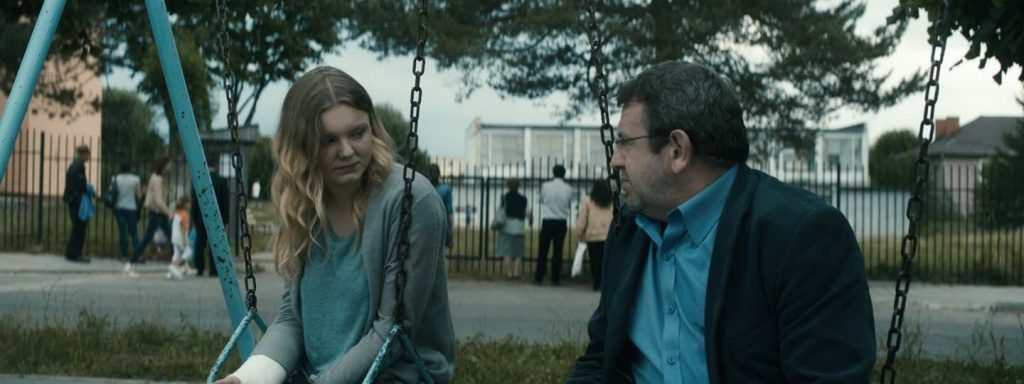
Many thanks to Christian Mungiu for taking the time to be interviewed and to learn more visit the official website for Graduation.
Trevor Hogg is a freelance video editor and writer who currently resides in Canada; he can be found at LinkedIn.









